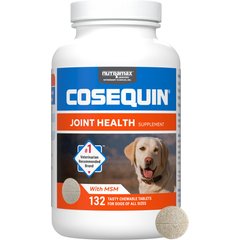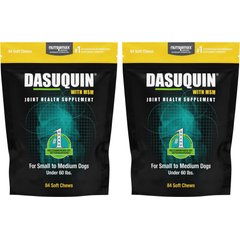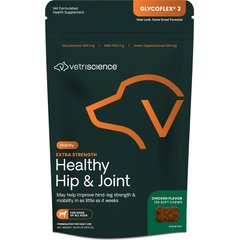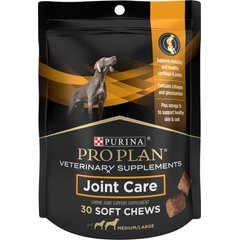Glucosamine for Dogs: Does It Help Dogs With Arthritis?
What Is Glucosamine?
People and pets can both take glucosamine, an amino sugar that may assist in building the body’s ligaments, tendons, cartilage, and fluid that surrounds the joints. But how does it work?
Read on to learn everything you need to know about glucosamine for dogs.
Glucosamine isn’t a drug—it’s a type of dietary supplement that is typically called a nutraceutical—a substance found in food that can improve health beyond its typical nutritional value.
Glucosamine promotes joint health and is often sourced from shellfish when included in joint supplements.
A few facts about joint anatomy can help you understand how glucosamine works.
Most joints are made up of the ends of bones covered in cartilage that are bathed in joint fluid and surrounded by soft tissues.
Glucosamine is an essential part of the process of making and maintaining joint cartilage. Glucosamine supplements may encourage the growth of cartilage cells and help reduce inflammation in joints.
Key Takeaways
- Glucosamine is a dietary supplement that may support joint health in dogs.
- Glucosamine is a safe supplement for pups—at high doses, it can cause increased thirst or an upset stomach.
- Doses for glucosamine are based the specifics of your dog. Talk to your vet for an appropriate dose.
Does Glucosamine Help Dogs with Arthritis?
So, does glucosamine work?
Unfortunately, the research into using glucosamine to treat arthritis in dogs is contradictory. Some papers, such as this study from 2007, appear to show benefits, while other research doesn’t.
Many veterinarians advise pet parents that:
-
Glucosamine may or may not help your dog, but it is safe and worth a try.
-
It should be most effective in cases of mild to moderate osteoarthritis. It shouldn’t be used when a dog has other types of arthritis like septic arthritis (caused by an infection) or immune-mediated polyarthritis (caused by an abnormal immune reaction).
-
Glucosamine can also safely be given as a preventive measure to dogs that are at high risk for developing arthritis.
Most joint supplements for dogs contain more than just glucosamine. For example, glucosamine seems to work better when it is combined with chondroitin, another dietary supplement. They appear to be more effective in combination than either substance is alone, and may be able to:
-
Prevent or reduce the breakdown of cartilage
-
Help repair cartilage
-
Increase the production of joint fluid and improve its quality
-
Decrease joint inflammation and pain
Dogs with arthritis generally respond best to multi-modal therapy, when different types of treatments are used at the same time. Treatment for arthritis in dogs can include:
-
Nutritional supplements
-
Prescription medications like Rimadyl®, Galliprant®, Deramaxx®, Previcox®, tramadol, gabapentin, amantadine, and Adequan®
-
Herbal remedies such as Boswellia or green tea extract
-
Regenerative therapies (stem cells or platelet-rich plasma, for example)
-
Surgery
Best Glucosamine Products for Dogs
Your favorite pet shop likely carries many over-the-counter joint supplements containing glucosamine. Your best options are made by reputable companies and have been vetted by the National Animal Supplement Council. Good glucosamine products for dogs include:
-
Cosequin Maximum Strength—a chewable tablet containing glucosamine hydrochloride, sodium chondroitin sulfate, MSM, and manganese ascorbate
-
Dasuquin—a tasty soft chew that contains glucosamine hydrochloride, sodium chondroitin sulfate, ASU, MSM, Boswellia extract, and green tea extract
-
GlycoFlex Stage 3—a chicken-flavored soft chew that contains glucosamine hydrochloride, MSM, Perna canaliculus, DMG, and antioxidants
-
Purina Pro Plan Veterinary Diets Joint Supplement for Dogs—a liver-flavored soft chew made with glucosamine hydrochloride, collagen, chondroitin sulfate, omega-3 fatty acids, and hyaluronic acid. This supplement is often used in combination with Purina Pro Plan Veterinary Diets JM Joint Mobility Dry Dog Food.
Side Effects of Glucosamine in Dogs
Glucosamine is very safe. When taken at very high doses, it may cause increased thirst and urination or an upset stomach, but these types of side effects are rare.
Of course, most joint supplements for dogs contain other active ingredients as well, so if you notice any concerning symptoms, such as vomiting or diarrhea, stop giving the product to your dog and contact your veterinarian.
Avoid giving glucosamine to any dog with a known allergy to shellfish. This supplement is usually made from shellfish and may lead to a worsening of the dog’s allergy symptoms.
Because glucosamine is a dietary supplement and not a prescription medicine, it doesn’t undergo the same level of regulation. Before you purchase a joint supplement, speak with your vet.
How Much Glucosamine Should I Give My Dog?
Doses for glucosamine are based on the specifics of a dog’s case. Always follow label directions and talk to your veterinarian.
Glucosamine in Dogs FAQs
Can dogs take human glucosamine?
Never give your dog any supplement that is labeled for human use without talking to your vet first.
Some glucosamine supplements designed for people can be safe for dogs, but others may contain dangerous ingredients. Your vet will advise you on what is best for your pup.
The best glucosamine products for dogs will also have dosing recommendations printed on the label, which makes it much easier to figure out how much glucosamine to give dogs.
Featured Image: Stock.adobe.com/Justyna




